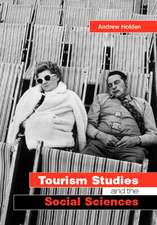The Routledge Handbook of Tourism and the Environment
Editat de Andrew Holden, David Fennellen Limba Engleză Paperback – 16 iun 2017
The book is divided in to five interrelated sections. Section one evaluates the philosophical basis, rationale and complexity of what is meant by the term ‘environment’ considering the major influences in the construction of how we understand our surroundings and the types of values we place upon them. Section two evaluates the types of eco-systems that are used as natural resources for tourism and the negative and positive impacts upon them. Section three evaluates relevant environmental policy and management mechanisms for the impacts of tourism on the natural environment. Section four focuses on the changing tourism-environment relationship, and the types of tourism that have become established in the tourism industry, market and policy. Section five, analyzes contemporary and future issues of the tourism-environment relationship, based upon themes of environmental and social welfare.
This timely book will provide an invaluable resource for all those with an interest in tourism’s relationship with the natural environment, encouraging dialogue across disciplinary boundaries and areas of study. The book is international in its focus, emphasizing that issues of tourism and the natural environment are not only localized but transcend national boundaries that sometimes require both international and global responses. This is essential reading for student, researchers and academics of Tourism as well as those of Geography, Environmental Studies and Development Studies.
| Toate formatele și edițiile | Preț | Express |
|---|---|---|
| Paperback (1) | 338.33 lei 43-57 zile | |
| Taylor & Francis – 16 iun 2017 | 338.33 lei 43-57 zile | |
| Hardback (1) | 1251.68 lei 43-57 zile | |
| Taylor & Francis – 2 iul 2012 | 1251.68 lei 43-57 zile |
Preț: 338.33 lei
Preț vechi: 394.31 lei
-14% Nou
Puncte Express: 507
Preț estimativ în valută:
64.74€ • 67.77$ • 53.57£
64.74€ • 67.77$ • 53.57£
Carte tipărită la comandă
Livrare economică 07-21 aprilie
Preluare comenzi: 021 569.72.76
Specificații
ISBN-13: 9781138071384
ISBN-10: 1138071382
Pagini: 624
Ilustrații: 40
Dimensiuni: 174 x 246 x 45 mm
Greutate: 0.45 kg
Ediția:1
Editura: Taylor & Francis
Colecția Routledge
Locul publicării:Oxford, United Kingdom
ISBN-10: 1138071382
Pagini: 624
Ilustrații: 40
Dimensiuni: 174 x 246 x 45 mm
Greutate: 0.45 kg
Ediția:1
Editura: Taylor & Francis
Colecția Routledge
Locul publicării:Oxford, United Kingdom
Public țintă
PostgraduateCuprins
Part 1: Scientific Realties and Cultural Constructs of the Environment 1. Introduction 2. The Natural Science Ontology of Environment 3. Social Science Ontology of Environment: Challenges to Human Exceptionalism 4. Religious Views of the Environment: Sanctification of Nature and Implications for Tourism 5. Tourism and Indigenous Reverence: The Possibilities for Recovery of Land and Revitalization of Life 6. ‘Prophets of Nature’: Romantic Ideals of Nature and their Continuing Relevance for Tourism Today 7. The Importance of the Aesthetic 8. Viewing Nature Politically 9. Using Complexity Theory to Develop Understanding of Tourism and the Environment 10. Tourism and Romantic Myths of Nature: The Evolution of a Discursive Relationship Part 2: Eco-Systems and Impact Issues 11. Introduction 12. Nature Bites Back: Impacts of the Environment on Tourism 13. Biodiversity and Tourism 14. ‘Tourism into the Wild’: The Limits of Tourism in Wilderness 15. Freshwater Systems and Tourism 16. Marine Systems and Tourism 17. Mountain Environments and Tourism 18. Orchids: An Example of Charismatic Megaflora Tourism? 19. Islands Tourism Part 3: Environmental Policy, Resource Governance and Management 20. Introduction 21. The Brundtland Report (Our Common Future) and Tourism 22. Framework Conventions for Climate Change: An Analysis of Global Framework Conventions with Reference to Resource Governance and Environmental Management Approaches in New Zealand 23. The Vulnerability of Tourism to Climate Change 24. Demand Management for the Sustainability of Tourism 25. Zoning, Land-Use Planning and Tourism 26. Protected Areas and Tourism 27. Limits of Acceptable Change and Tourism 28. Sustainable Tourism Certification 29. Lessons Learned: Knowledge Management and Tourism Development Part 4: Terminology and Types of Tourism 30. Introduction 31. Eco-Tourism 32. Nature-Based Tourism 33. Wildlife Tourism 34. Agritourism: In Between Rural change, Tourism Restructuring and Environmental Imperatives 35. Slow Travel 36. Responsible Tourism: Whose Responsibility? 37. Pro-Poor Tourism and Local Economic Development Part 5: Contemporary and Future Issues 38. Introduction 39. Climate Change and Tourism 40. Water and Tourism 41. Community-Based Ecotourism as Indigenous Social Entrepreneurship 42. Tourism’s Wasteful Way 43. Fair Trade in Tourism – Critical Shifts and Perspectives 44. Resiliency and Uncertainty in Tourism 45. Tourism and CSR 46. Environmental Security and Tourism 47. Adaptive Co-Management: A New Frontier for Nature-Based Tourism 48. Measurement of Corporate Social Performance in Tourism
Descriere
The Routledge Handbook of Tourism and the Environment explores and critically evaluates the debates and controversies inherent to tourism’s relationship with nature, especially pertinent at a time of major re-evaluation of our relationship with the environment as a consequence of the environmental problems we now face. It brings together leading specialists from range of disciplinary backgrounds and geographical regions, to provide state-of-the-art theoretical reflection and empirical research on this complex relationship and future direction.









